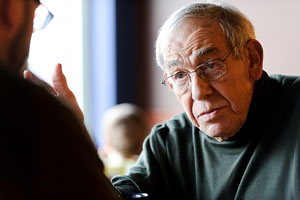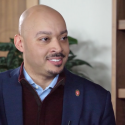Historian’s work gives a glimpse of Nixon “unplugged”
Historians and political junkies soon will have more Richard Nixon material to kick around, thanks to a UW–Madison professor emeritus who has fought for years to get the secret records of the former president made public.

Stanley Kutler, professor emeritus of law and history at UW–Madison, is pictured during an interview at a coffee shop in Madison, Wis., on Oct. 31, 2011. Author of the 1997 book “Abuse of Power,” Kutler is an expert on former President Richard Nixon and the 1972 Watergate scandal.
Photo: Jeff Miller
Stanley Kutler, the emeritus professor of law and history whose successful court challenge is responsible for their release, says the records will be a chance to hear Nixon minus his lawyers, handlers and “spinmeisters.”
“This is a chance to hear Richard Nixon unplugged, if you will,” says Kutler, nationally recognized as a top expert on the Nixon administration and the Watergate era.
The National Archives and the Richard Nixon Presidential Library on Thursday, Nov. 10 will release the recordings and documents, including a transcript of Nixon’s grand jury testimony related to the Watergate investigation. [Nov. 10 update: Here is a link to the records.]
The testimony was given in June 1975, almost a year after Nixon resigned and after he was pardoned by his successor, Gerald Ford. The grand jury was dismissed about two weeks after Nixon was interviewed by prosecutors, ultimately handing down no indictments in the wake of his testimony.
News accounts at the time reported that the testimony covered the 18½-minute gap in a White House tape recording of a conversation between Nixon and his chief of staff, H.R. Haldeman; the alteration of White House tape transcripts submitted to the House Judiciary Committee during its impeachment inquiry; the extent to which the Nixon administration used the Internal Revenue Service to harass political opponents; and Howard Hughes’s payment to Nixon friend Charles Rebozo.
Kutler doesn’t put much stock in those reports, chalking them up to spin by Nixon’s lawyers or the prosecutors. He’s not speculating about the substance of the testimony, but he is expecting cagey answers from the man political opponents labeled “Tricky Dick.”
“Let’s not kid ourselves. Richard Nixon had been around the block for 30-some years” at the time of the testimony, Kutler says. “He knew how to finesse questions, evade them, give a kind of ambiguous answer. Let’s just say this: I would probably be the most shocked person if there were something truly major in there.”
This isn’t the first time Kutler has been able to pry Nixon records from the vault of secrecy. In 1996, Kutler won a lengthy legal battle to get recordings released that verified Nixon’s knowledge and participation in the Watergate cover-up.
Kutler authored a 1997 book, “Abuse of Power: The New Nixon Tapes,” about the records released in 1996. He is also the author of “The Wars of Watergate: The Last Crisis of Richard Nixon,” considered by many to be the definitive book on the scandal. Currently, he is collaborating with actor Harry Shearer on a television series based on the Nixon tapes for the British television network Sky. Shearer plays Nixon in the comedy series.
“People don’t believe Nixon is a comic figure when I tell this to people. They say, ‘What do you mean?’ I say, ‘I am not a crook,’” Kutler says in a spot-on Nixon imitation. “That gets laughs every time.”
The latest court victory is quite a coup for open records advocates because traditionally, grand jury testimony is kept private. The release of the records was opposed by the Obama administration, citing the privacy of individuals mentioned in the testimony. But in July, U.S. District Court Judge Royce C. Lamberth III ordered the records released, writing in his decision that they have “undisputed historical interest.”
“To be sure, Watergate’s significance in American history cannot be overstated,” Lamberth wrote in his decision. “Nearly forty years later, Watergate continues to capture both scholarly and public interest. The disclosure of President Nixon’s grand jury testimony would likely enhance the existing historical record, foster further scholarly discussion, and improve the public’s understanding of a significant historical event.”
Kutler says the records likely would not have been released if Nixon were still alive. The historical importance of the investigation, and the need to thoroughly document and understand that dark chapter in our country’s history, trumps privacy arguments, he says.
“Historians are dependent on source material. That was a source out there that was being kept from us,” Kutler says. “This is all about establishing further precedent, to make things more transparent.”



